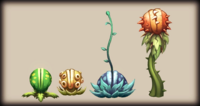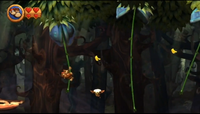Ape-Eating Plant: Difference between revisions
Doomdorm64 (talk | contribs) No edit summary |
LinkTheLefty (talk | contribs) mNo edit summary |
||
| (23 intermediate revisions by 10 users not shown) | |||
| Line 1: | Line 1: | ||
{{ | {{species infobox | ||
|image=[[File:ChompDKCR.png|200px]]<br>Concept artwork of the Chomps | |image=[[File:ChompDKCR.png|200px]]<br>Concept artwork of the Chomps (the hungry plant is the blue plant) | ||
|first_appearance=''[[Donkey Kong Country Returns]]'' ([[List of games by date#2010|2010]]) | |first_appearance=''[[Donkey Kong Country Returns]]'' ([[List of games by date#2010|2010]]) | ||
|latest_appearance=''[[Donkey Kong Country Returns 3D]]'' ([[List of games by date#2013|2013]]) | |latest_appearance=''[[Donkey Kong Country Returns 3D]]'' ([[List of games by date#2013|2013]]) | ||
|variant_of=[[Chomp (Donkey Kong Country series)|Chomp (''Donkey Kong Country'' series)]] | |||
}} | }} | ||
[[File:DKCR Chomppic1.png|left|thumb|200px|Some | [[File:DKCR Chomppic1.png|left|thumb|200px|Some hungry plants]] | ||
''' | '''Ape-Eating Plants''',<ref>Knight, Michael, and Alexander Musa. ''Donkey Kong Country Returns 3D'' Prima Official Game Guide. Page 95. "''The next vines you swing across have Ape-Eating Plants at the top.''"</ref> originally known as '''hungry plants''',<ref>Knight, Michael. ''Donkey Kong Country Returns'' Prima Official Game Guide. Page 87. "''The next vines you swing across have hungry plants at the top.''"</ref> are carnivorous plant enemies that appear in ''[[Donkey Kong Country Returns]]'' and ''[[Donkey Kong Country Returns 3D]]''. They are blue, medium-sized variant of [[Chomp (Donkey Kong Country Returns)|Chomps]] with a tongue in the shape of a vine. Ape-Eating Plants only appear in some vine levels of the [[Forest (Donkey Kong Country Returns)|Forest]] world, and their first level appearance is [[Vine Valley (level)|Vine Valley]]. | ||
Ape-Eating Plants always appear on the ceiling where they hide behind some leaves while sticking their tongue down. When the [[Kong]]s grab its tongue, the plant slowly pulls the tongue back to its mouth, attempting to eat the Kongs. Its tongue is necessary for progressing higher into the level, and the Kongs must quickly get off its tongue to avoid being eaten. If it does, although a prompt does not appear to indicate this like with [[green Chomp]]s, the player is able to force the Kongs out by shaking the controller (pressing {{button|3ds|x}} or {{button|3ds|y}} repeatedly in the 3DS version). If successful, the Kongs escape unharmed; otherwise, after a period of time, the plant spits them out and they lose a heart. Ape-Eating Plants cannot be defeated by any attack. | |||
{{br|left}} | |||
==Names in other languages== | |||
{{foreign names | |||
|Jap=アオパクパク<ref>「ドンキーコングリターンズ任天堂公式ガイドブック」 (''Donkey Kong Returns Nintendo Kōshiki Guidebook''), [[media:DKR Shogakukan P21.jpg|page 21]].</ref> | |||
|JapR=Ao Pakupaku | |||
|JapM=From「青」(''ao'', blue) and「パクパク」(''pakupaku'', onomatopoeia for devouring) | |||
}} | |||
==References== | |||
<references/> | |||
{{DKCR}} | {{DKCR}} | ||
[[Category:Carnivorous | [[Category:Carnivorous plants]] | ||
[[Category:Donkey Kong Country Returns | [[Category:Donkey Kong Country Returns enemies]] | ||
Latest revision as of 19:09, March 7, 2024
| Ape-Eating Plant | |
|---|---|
 Concept artwork of the Chomps (the hungry plant is the blue plant) | |
| First appearance | Donkey Kong Country Returns (2010) |
| Latest appearance | Donkey Kong Country Returns 3D (2013) |
| Variant of | Chomp (Donkey Kong Country series) |
Ape-Eating Plants,[1] originally known as hungry plants,[2] are carnivorous plant enemies that appear in Donkey Kong Country Returns and Donkey Kong Country Returns 3D. They are blue, medium-sized variant of Chomps with a tongue in the shape of a vine. Ape-Eating Plants only appear in some vine levels of the Forest world, and their first level appearance is Vine Valley.
Ape-Eating Plants always appear on the ceiling where they hide behind some leaves while sticking their tongue down. When the Kongs grab its tongue, the plant slowly pulls the tongue back to its mouth, attempting to eat the Kongs. Its tongue is necessary for progressing higher into the level, and the Kongs must quickly get off its tongue to avoid being eaten. If it does, although a prompt does not appear to indicate this like with green Chomps, the player is able to force the Kongs out by shaking the controller (pressing or
repeatedly in the 3DS version). If successful, the Kongs escape unharmed; otherwise, after a period of time, the plant spits them out and they lose a heart. Ape-Eating Plants cannot be defeated by any attack.
Names in other languages[edit]
| Language | Name | Meaning |
|---|---|---|
| Japanese | アオパクパク[3] Ao Pakupaku |
From「青」(ao, blue) and「パクパク」(pakupaku, onomatopoeia for devouring) |
References[edit]
- ^ Knight, Michael, and Alexander Musa. Donkey Kong Country Returns 3D Prima Official Game Guide. Page 95. "The next vines you swing across have Ape-Eating Plants at the top."
- ^ Knight, Michael. Donkey Kong Country Returns Prima Official Game Guide. Page 87. "The next vines you swing across have hungry plants at the top."
- ^ 「ドンキーコングリターンズ任天堂公式ガイドブック」 (Donkey Kong Returns Nintendo Kōshiki Guidebook), page 21.
